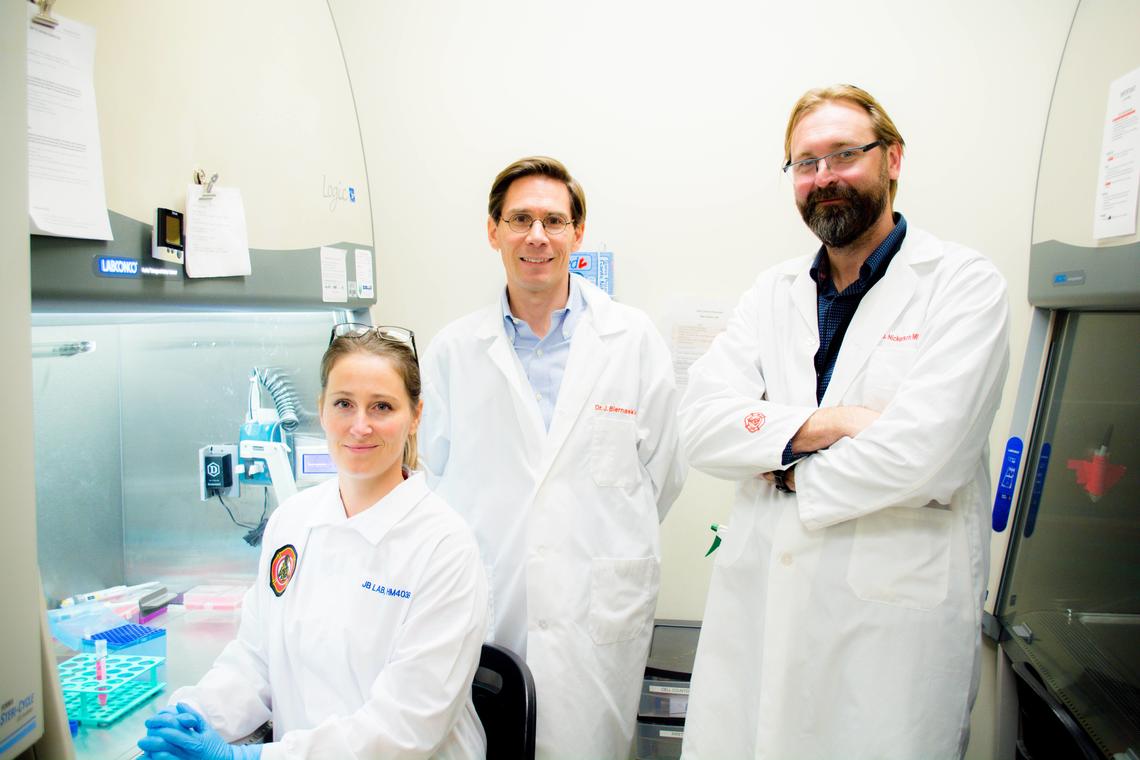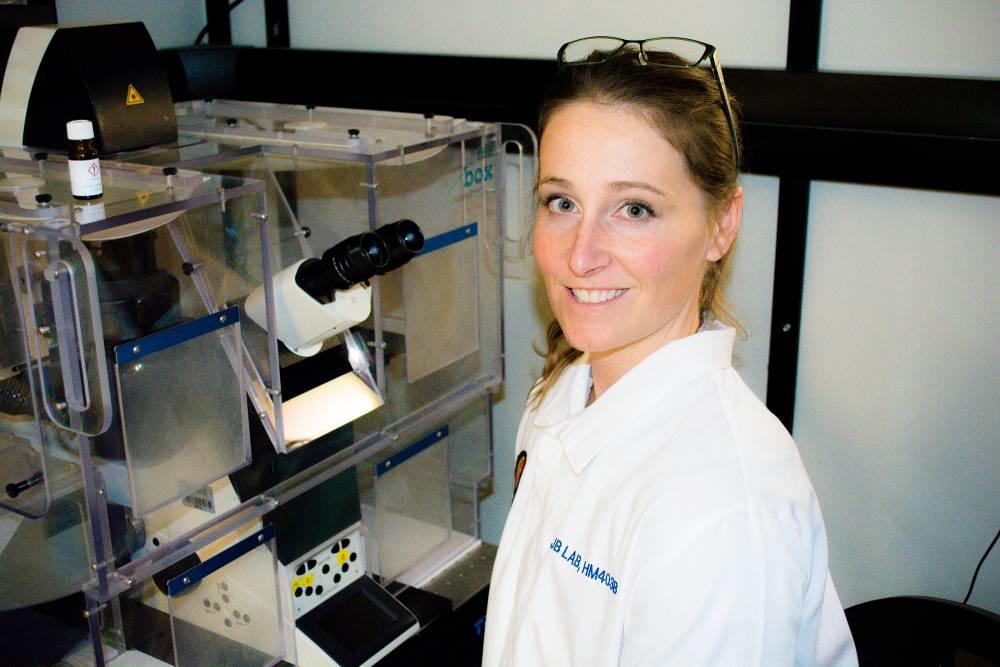Jan. 14, 2022
UCalgary veterinarian’s interdisciplinary work in regenerative medicine earns a Canada Research Chair

As a veterinarian, Dr. Holly Sparks has a passion to help heal animals of all types. But her real passion is working with equine athletes. “Horses are really incredible animals who play many diverse roles in our society. Since I was little, I have always cared deeply about keeping them healthy and happy.”
Yet, across her career in clinical practice, Sparks occasionally came up against challenging cases, especially with the healing of skin wounds and musculoskeletal injuries. “I realized that there was still a lot to learn about how we can best treat and prevent these injuries, and that kind of spurred me into a PhD,” says Sparks, DVM, PhD, assistant professor, large animal surgery at the University of Calgary Faculty of Veterinary Medicine (UCVM).
Sparks first got a taste of research when she was accepted into an equine orthopedic research program at Cornell University, shortly after her graduation from veterinary college at Michigan State University. She went on to complete a residency at the University of Saskatchewan and became board certified in large animal surgery. But it was her intense desire to find better ways to help horses heal after injury that motivated Sparks to return to academia.
She pursued a PhD in regenerative medicine at UCalgary with Dr. Jeff Biernaskie, PhD, a professor of stem cell biology at UCVM, and the Calgary Firefighters Burn Treatment Society Chair in Skin Regeneration and Wound Healing. Her zeal for drilling down into clinical conundrums is now being recognized with an NSERC Tier 2 Canada Research Chair (CRC) in Equine Regenerative Medicine.

Holly Sparks has collaborated on projects with her mentors Jeff Biernaskie and Vincent Gabriel.
Rahil Tarique
Sparks is one of two UCalgary scholars awarded a CRC by the federal government this week. Dr. Marc Strous, PhD, professor in the Faculty of Science, was also recognized. Three scholars from the Faculty of Arts, Dr. Ken Waters, PhD; Dr. Amanda Melin, PhD; and Dr. Marit Rosol, PhD, have had their CRCs renewed for another term.
“As veterinarians, we are trained to care for a variety of animal species and we really value how much we can learn from inter-species similarities and differences. In my PhD, I was able to take that a step further, through my co-mentorship by physician Dr. Vince Gabriel, which allowed me to appreciate the many overlapping clinical challenges in human and veterinary medicine," Sparks says.
"We can learn a lot about these shared problems by working together. That collaboration and camaraderie is something I definitely want to maintain in my new program.”
New research program could be a change-maker in Canadian regenerative medicine
“Through her veterinary clinical practice, Holly began to appreciate the relative absence of objective evidence to support the efficacy of emerging cell-based therapeutics for musculoskeletal disease,” says Biernaskie, who is delighted about her CRC.
“She is on a mission to not only develop new regenerative therapies, but to also improve efficacy and utility of therapies currently available in clinical practice. Her previous experience in running large animal veterinary clinical trials is also a key asset and will be invaluable to the new Centre for Cell Therapy Translation here at UCalgary.”
Sparks is taking what she’s learned about wound healing in the Biernaskie lab and expanding her research program to focus on equine regenerative medicine and musculoskeletal injuries of horses.

Sparks credits the cross-faculty, multidisciplinary collaborative culture at UCalgary for broadening her learning and research opportunities.
Rahil Tarique
“My goal for this program is to better understand what happens, at a cellular and molecular level, in injured tissues and why they heal with scar versus regenerating functional tissue,” says Sparks, who is also a member of the McCaig Institute for Bone and Joint Health at the Cumming School of Medicine.
Scar formation after an injury comes with a host of problems, which can leave both equine and human patients debilitated. “The goal of regenerative medicine is to be able to mitigate that scar formation and restore normal tissue function after injury,” she says.
Research could translate into new therapies for both horses and humans
One of the new projects Sparks is undertaking looks at tendon injuries in equine athletes. “Tendon injury is a significant clinical challenge, largely because tendons are designed to function at nearly their biomechanical limits during exercise. When fibrosis develops here, it becomes weakened and prone to chronic pain and re-injury. We want to understand why this scar tissue develops and figure out how to prevent its development.”
“As a large animal veterinary surgeon who is uniquely armed with expertise in molecular and stem cell biology, Holly will be able to undertake translational research that is simply out of reach for most other laboratories around the world,” says Biernaskie. “I have every confidence her future research program will be a change-maker in Canadian regenerative medicine.”
“Tendinopathy is unfortunately common across species, yet we still have a lot to understand about why these injuries develop and how we can both prevent and treat them. With the growth of our regenerative medicine research program, we hope we can develop new techniques for both human and equine patients to put the ‘spring back in their step’,” says Sparks.
UCalgary’s collaborative culture supports scholarship and discovery
Sparks credits the cross-faculty, multidisciplinary collaborative culture at UCalgary for broadening her learning and research opportunities. “The diversity of expertise at UCalgary really makes for a unique training and research environment. I am so grateful to have had the opportunity to develop some exciting collaborations with really talented physicians, veterinarians, cell biologists, and engineers to work towards a common goal of helping patients heal,” says Sparks.
During her PhD, Sparks was introduced to a wealth of cutting-edge scientific approaches. “I want to continue on that path and apply those tools to study acute and chronic disease in other connective tissues. This CRC position allows me to combine my skills as a clinician-scientist to bridge the gap between clinical practice and research to ultimately help more patients, which is something I’m really passionate about.”







